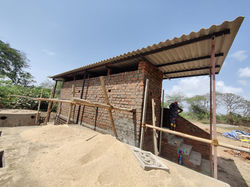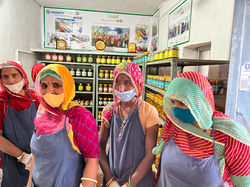Current Two Thematic Areas
We leverage strong presence, and strengths of our partner Organizations in India
Thematic Area Overview:
Migrant Workers’ Well-being
 Before the new shelters were built, the boiler workers lived in such shacks. |
|---|
 This settlement of daily wage earners (naka Majoor) has almost 1000 such shacks. |
 Increasingly families with small children come with their parents to worksites. |
 Co-Solve supported first implementation of shelters at a Textile unit’s six boiler worker families. |
 Our childcare program for boiler workers’ children at the industrial site. |
 Our pilot project for brickworkers toilets in South Gujarat |
India’s economy, public health, and social harmony are directly dictated by the extent of well-being of India’s 70+ million unskilled migrant workers at their work destination.
We are working on this highly contextualized thematic area by engaging with diverse stakeholders for Innovative scalable solutions.
FOUR PROGRAM AREAS:
1) Dignified Shelters, Sanitation, Energy
2) Childcare and Educational Spaces and Services at or near Worksites
3) Nutrition and Health
4) Mobile Groceries and Supplies at doorstep
Our findings and upcoming path
Finding effective shelter solutions for migrant workers requires more than a simple techno-economic approach. A major challenge lies in accurately understanding and incorporating the needs of users into the design process. The diverse backgrounds of migrant workers mean that shelters must strike a balance between universal features and those tailored to the distinct social and cultural contexts of different communities. Additionally, the choice of building materials is critical—they must be affordable, easy to source, fabricate, assemble, disassemble, and transport.
This market segment has been chronically underserved, resulting in limited precedents to guide the design of suitable shelters. With funding from COSOLVE Collective, the SahKaryam Foundation and Aajeevika Bureau are collaborating to develop multiple prototypes to evaluate the durability and effectiveness of these design criteria in various challenging work environments. Continuous monitoring and feedback from users will be crucial for refining the prototypes before scaling up production.
Thematic Area Overview:
Livelihood
Enabling the farmers…
 |
|---|
 Village-level Meeting of Women Entreprenuers In Rajasthan |
 Women farmers with small vegatable and grain land parcels in Rajasthan share solar irrigation technology in their farming community. |
 The women-owned, operated, and governed enterprises make consensus decisions about investing in their business. |
 Co-Solve;s loan grant is tied to the profitably of the women-owned company. |
 Solar Cold Storage unit funded on loan-grant being installed for women vegetable growers in Rajasthan |
 Women’s livelihoods are connected in this enterprise by linking the vegetable production and value-added consumable products. |
The small farmer's ability to cultivate crops is deeply impacted by access to enabling technologies such as cold storage. However when large rural farming areas suffer from unreliable and even lack of electric grid power the intervention of cold storage becomes most critical for these women.
In early 2022 Co-Solve has partnered with Manjari Foundation with headquarter in Dholpur, Rajasthan to address this need. Manjari Foundation has more than 100,000 women farmers engaged in a number of livelihood social enterprises in multiple North Indian states.
Our model has three features - 1. Reliable solar powered cold-storage, 2. Rent a shelf space financial model to recover operational and depreciated capital costs through loan grant for five years, 3. Empower the women farmer's company itself to make operational, business, maintenance, loan payments decisions and arrangements.
We aim to enable farmers to better control their value chain.
2024 Copyrights The Co-Solve Collective